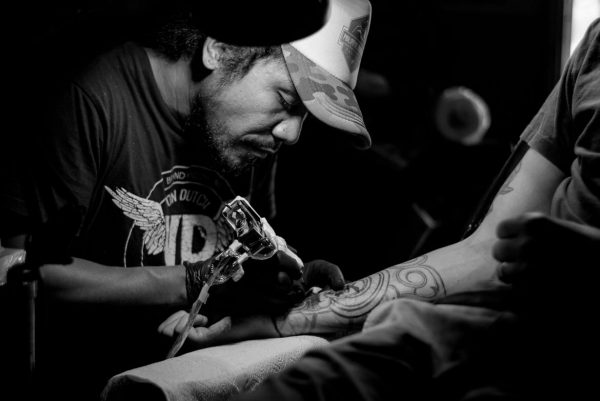What age can you get a tattoo? Are you considering getting a tattoo but you don’t know the laws about tattoos?
A tattoo is for life, so you shouldn’t rush into getting one done, especially if you are a minor.
Today I will explain the reasons behind tattoo age restrictions, the risks involved, but also what are the most painful body parts for tattoos.
Table of Contents
 History of tattoos
History of tattoos
The earliest evidence of tattoo art dates from 5000 BCE, however across time and cultures, tattoos had different meanings and forms.
The oldest known human to have tattoos preserved on his mummified body is a Bronze-Age man from 3300 BCE. “Otzi the Iceman” had 57 tattoos, located on or near acupuncture points.
During the eight to sixth centuries BCE, in the early Greek and Roman times, tattooing was associated with barbarians. Learning tattooing from Persians, the Greeks used it to mark slaves and criminals so they can be idetified in case they tried to escape.
Laws about tattoos
In general, the laws about tattoos have two reasons behind:
- Tattooing being considered a medical procedure, minimum standards must be met.
- Old school mentality, tattooing still being looked down by many.
 Risks
Risks
“Should I get a tattoo?” It is a question in many people’ minds, including minors. Tattoos breach the skin, therefore there is a high risk for skin infection and other complications such as:
- Allergic reactions caused by tattoo dyes. This can appear even years after you get the tattoo.
- Skin infections may occur right after tattooing.
- Other skin problems may appear around the tattoo ink. Such as granuloma or kelodis.
- If the equipment used to create your tattoo is contaminated with infected blood, you can contract various blood diseases such as hepatitis B or hepatitis C .
- Rarely, tattoos cause swelling or burning in the affected areas during MRI exams.
Lists of states and their tattooing laws
The minimum age to get a tattoo is 18 in most of the United States, and also in the United Kingdom, Canada and Australia. In some cases you might be able to get a tattoo even if you are younger than 18 years old, however with a parent consent, and depending on the state.
Generally, tattoo artists will not tattoo anyone under the age of 15 or 16, for safety and liability reasons. The table below outlines the tattooing laws for each state, but also in what states can you get a tattoo at 16.
| State | What age can you get a tattoo? | Tattoo age notes |
| Alabama | No minimum tattoo age | Minors need a written parent consent, which needs to be signed by the artist/ service provider too. |
| Alaska | 18 years old | Tattoos are prohibited for minors. |
| Arizona | No minimum tattoo age | Minors can get a tattoo, however a parent has to be present. |
| Arkansas | No minimum tattoo age | A parent’s signature is required for tattooing a minor. |
| California | 18 years old | Tattoos are prohibited for minors |
| Colorado | No minimum tattoo age | Minors need parental consent for a tattoo. |
| Connecticut | No minimum tattoo age | Minors need parental consent and a physician or registered nurse must be present during tattooing. |
| District of Columbia | 18 years old | Tattoos are prohibited on minors . |
| Delaware | No minimum tattoo age | Minors need parental consent for a tattoo. |
| Florida | 16 years old | Minors need parental consent for a tattoo. |
| Georgia | 18 years old | Minors can only be tattooed by a licensed physician or under their supervision |
| Hawaii | No minimum tattoo age | Minors need parental consent; consent forms are kept for two years confidentially. |
| Idaho | 14 years old | Minors 14-18 can be tattooed, but it requires consent in the presence of the tattoo artist. |
| Illinois | No minimum tattoo age | Minors need parental consent; minors can only be tattooed by a physician. |
| Indiana | No minimum tattoo age | Minors need a guardian present and written consent to be tattooed. |
| Iowa | 18 years old | Minors are prohibited from being tattooed. |
| Kansas | 16 years old | Minors need written parental consent. |
| Kentucky | No minimum tattoo age | Minors need parental consent. |
| Louisiana | 16 years old | Minors need parental consent. |
| Maine | 18 years old | Tattooing a minor is illegal. |
| Maryland | No minimum tattoo age | Minors need written parental consent, which must be retained for 3 years. |
| Massachusetts | No minimum tattoo age | Minors can only be tattooed by a licensed physician. |
| Michigan | No minimum tattoo age | Minors need parental consent. |
| Minnesota | No minimum age | Minors need parental consent. |
| Mississippi | 18 years old | Tattoos are prohibited on minors. |
| Missouri | No minimum tattoo age | Minors need parental consent, and parents must be present. |
| Montana | No minimum tattoo age | Minors need parental consent. |
| Nebraska | No minimum tattoo age | Minors need written parental consent. |
| Nevada | No minimum tattoo age | Tattooing isn’t regulated by the state except in Clark County (Las Vegas). |
| New Hampshire | No minimum tattoo age | Minors need a parent present and written consent. |
| New Jersey | 16 years old | Minors need parental consent. |
| New Mexico | No minimum tattoo age | Minors need written parent consent and presence during the procedure. |
| New York | 18 years old | Tattooing minors is prohibited, punishable with a class B misdemeanor. |
| North Carolina | 18 years old | Tattooing minors is prohibited. |
| North Dakota | No minimum tattoo age | Parental consent and presence required to tattoo a minor. |
| Ohio | No minimum tattoo age | Parental consent and presence required to tattoo a minor. |
| Oklahoma | 18 years old | Licensure is required by the State Department of Public Health for tattoo artists. |
| Oregon | 18 years old | Licensing is required. |
| Pennsylvania | No minimum tattoo age | Parental consent and presence required to tattoo a minor. |
| Rhode Island | 18 years old | Sterilization and sanitation requirements must be met. |
| South Carolina | 18 years old | Tattoos are prohibited for those under 21. Parental consent required if over 18. |
| South Dakota | No minimum tattoo age | Signed parental consent to tattoo a minor. |
| Tennessee | 16 years old | Minors 16 and up can be tattooed with written parental consent. |
| Texas | 18 years old | Tattooing minors is prohibited UNLESS to cover an existing obscene or offensive tattoo. Parental consent is required. |
| Utah | No minimum tattoo age | Tattoos on minors require written parental consent. |
| Vermont | No minimum tattoo age | Parental consent required to tattoo a minor. |
| Virginia | No minimum tattoo age | Tattooing a minor requires consent unless done by a physician. |
| Washington | 18 years old | Tattooing a minor is illegal and prohibited. |
| West Virginia | No minimum tattoo age | Minors require written consent. |
| Wisconsin | No minimum tattoo age | Only physicians can tattoo minors. |
| Wyoming | No minimum tattoo age | Minors need parental consent and to be present at the time of tattooing. Age must be verified with ID. |
 What states get you get a tattoo at 16
What states get you get a tattoo at 16
As we can see from the table above, there are a total of 35 states where you can get a tattoo at 16 years old, however with parental consent for most of them.
At the same time, there are 15 where the laws about tattoos are very strict for people under 18 years old.
Laws about tattoos in Canada, Australia and UK
As a country, Canada does not have a nation-wide minimum age for tattoos, however each individual province has a separate regulation.
In most Australia you must be 18 years old to get a tattoo. Only in Western Australia it is legal to get a tattoo if you are 16 years old, with parental control.
In the UK, it is prohibited to tattoo a person under 18 years old. Anyone who tattoos a minor can be prosecuted and fined.
| Canada provinces | Tattooing laws |
| Ontario | Minors require parental consent. |
| Quebec | There is no minimum tattoo age, however most shops have a minimum of 17-18 years of age. |
| Nova Scotia | There is no minimum tattoo age, however there are strict safety and sanitation standards. |
| Alberta | There is no law, but there is a guideline recommending a minimum age of 18. |
| British Columbia | There is no law, however the Ministry of Health recommends tattoo shops to obtain parental consent for people under 19 years old. |
| Saskatchewan | There is no law, but it is recommended for shops not to tattoo anyone under 18. |
 Should I get a tattoo and what body part?
Should I get a tattoo and what body part?
According to a 2010 study, 38% of people between 18 and 29 years old have been inked at least once in their lives, globally.
While getting a tattoo, your skin is being pierced repeatedly by a sharp needle, covered with pigment. So it is normal for it to be painful, however people may experience different levels of pain.
Usually the most painful body parts are those with the least fat, most nerve endings, and thinnest skin. The least painful places to get a tattoo are those with the most fat, fewest nerve endings, and thickest skin.
Most painful body parts for tattoos
These are the most painful tattoos based on the body part:
- Armpit tattoos
- Rib cage tattoos
- Ankles and shins tattoos
- Nipples and breasts tattoos
- Groin tattoos
- Elbows and knee cap tattoos
- Tattoos behind the knees
- Hips tattoos
- Neck and spine tattoos
- Tattoos on: head, face, and ears
- Lips tattoos
- Tattoos on hands, fingers, feet, and toes
- Stomach tattoos
- Tattoos on inner biceps
 The least painful body parts for tattoos
The least painful body parts for tattoos
Below are the least painful tattoos you can get:
- Tattoos on the upper outer thigh
- Forearm tattoos
- Tattoos on outer shoulders and biceps
- Calves tattoos
- Tattoos on the upper and lower back
Factors that affect pain when getting a tattoo
There are several factors that may affect how you feel pain:
- Gender: research suggest that women experience more pain than men;
- Experience: those who have had tattoos before, may feel less pain than somebody who gets a tattoo for the first time;
- Age and weight: it’s not supported by research, however it is considered that age and weight may make tattoos more painful.
 Things to consider before getting a tattoo
Things to consider before getting a tattoo
Getting a tattoo might take minutes to hours, while removing one is a much more time-consuming and painful process, with mixed results.
Before getting a tattoo, take into consideration:
- Risks of infections and allergies;
- Whether you will regret the design or not;
- The placement of your tattoo.
